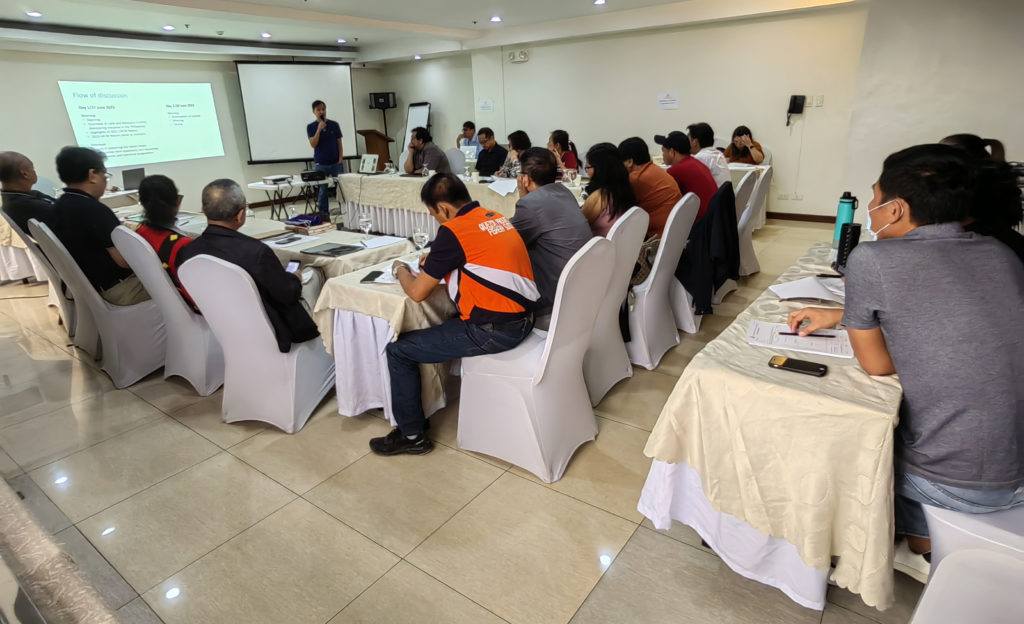ANGOC holds Orientation Workshop for the 2023 Philippine Land and Resource Conflict Monitoring
The Asian NGO Coalition for Agrarian Reform and Rural Development (ANGOC) and its partners held an Orientation Workshop for the 2023 Land and Resource Conflict Monitoring (LRCM) in the Philippines on 27 to 28 June in Quezon City, Philippines. This initiative is supported by We Effect and Swedish International Development Agency (SIDA) as part of the project, “Increasing Transparency and Accountability in Resource Governance Through Enhancing Capacities of The Rural Sector” which aims to (a) provide and facilitate for strategic discussion among farmers, indigenous peoples and fisherfolk organizations and support NGOs on people-cantered agenda, with emphasis on land and resource rights, sustainable resource management and participatory governance towards food security; and, (b) enhance the knowledge, skills and capacities of selected representatives of farmers, indigenous peoples and fisherfolk.
The workshop (a) discussed the Land and Resource Conflict Monitoring Initiative; (b) agreed on a common set of indicators to be used in documenting cases of land and resource conflict and human rights violations at the community level; and, (c) discussed ways of working together to produce the 2023 Philippine Land and Resource Conflict Monitoring Report.

The two-day event brought together 19 representatives (8 females, 11 males) from 14 networks and alliances of civil society organizations (CSOs) and People’s Organizations (POs) representing indigenous peoples, small farmers and fisherfolk. Two participants came from the youth sector.
Presented during the workshop were an introduction to LRCM in the Philippines, summary findings of the 2021 LRCM report, introduction to the 2023 report including the monitoring framework, indicators, methodology, concepts and definitions. The earlier 2021 Philippine LCRM Report showed that there were 235 ongoing cases of land & resource conflict in the country, covering at least 1.9 million hectares and directly affecting more than 551 families. There were also 106 reported cases of human rights violations for 2021, affecting 63 individuals and 43 families.”
The participants agreed that the purpose of the monitoring are to find trends and patterns on land conflicts, to bring public attention/systematic response to conflict cases, to raise public awareness and discussion, and to evoke public policy responses. The participants also expressed their support for the conduct of the 2023 Philippine Land and Resource Conflict Monitoring initiative.
The focus of the monitoring shall be on structural land and resource conflicts that impact on local communities. so that social issues are highlighted and questions about public policy and development priorities are raised.
In terms of methodology, a case approach will be used, focused on the “storylines” of land conflict. The 2023 Study will pivot on four main parameters: a) populations and areas affected by conflict, b) adversarial claimants on the land; c) incidents or cases of violence and human rights violations against individuals and communities; and d) responses and actions taken to address conflict. The report will cover the 12-month period of 2023.
Toward this end, the participants will constitute as the “Land Conflict Watch.”
#
This online article has been produced with the financial assistance of Swedish International Development Agency (SIDA) and We Effect. The contents of this document are the sole responsibility of Asian NGO Coalition for Agrarian Reform and Rural Development (ANGOC) and can under no circumstances be regarded as reflecting the position of SIDA. SIDA and We Effect do not necessarily agree with the opinions expressed.
